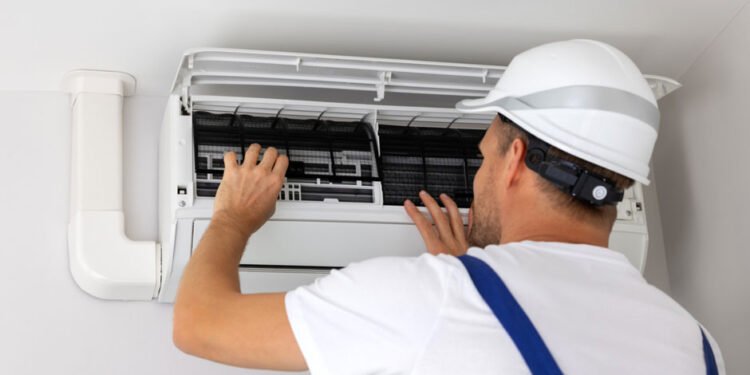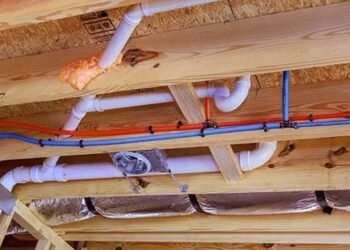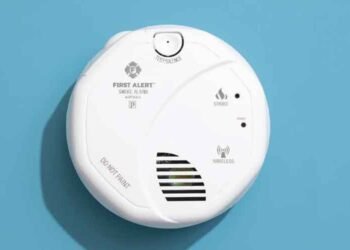Understanding the Basics of AC Maintenance
Air conditioning units are the backbone of comfort in any indoor setting when temperatures soar. To get the best out of these units, it’s crucial to understand how they function and the essential components involved. Typically, every air conditioner unit, whether a central system or a window unit, consists of parts like filters, coils, and fins. These parts must be regarded as the lifeblood of your AC. Their maintenance is paramount for sustained performance and efficiency.
Recognizing signs of wear and performance issues is key. For instance, if your AC is not cooling as efficiently as before, it might be a cue to clean or replace certain components. Before diving into the technicalities of maintenance, start by familiarizing yourself with the system’s user manual, which often contains indispensable insights into your specific model. For larger, more intricate systems, reaching out for professional AC repair Portland can nip potential issues in the bud, saving time and money in the long haul.
Importance of Regular Cleaning
Cleanliness directly correlates with efficiency when it comes to air conditioners. Dirt and filter blockages restrict normal airflow, causing the unit to work doubly hard to cool the space, leading to elevated energy usage. Experts advise that replacing a clogged filter with a clean one could slash the unit’s energy consumption by 5% to 15%. Additionally, coils, responsible for air exchange, need consistent cleaning checks. Clean coils efficiently transfer heat, providing effective cooling and reducing strain on the system.
Routine maintenance routines might seem tedious, but they form an essential preventive measure against larger issues that may arise due to prolonged negligence. The recommendation is to adhere to a monthly or bi-monthly cleaning cycle, which can vary depending on usage intensity and environmental conditions.
DIY Maintenance Tips
Embracing do-it-yourself maintenance can be an empowering and cost-effective approach to prolonging the life of your AC unit. Start by ensuring the power is off to provide a safe working environment. Consider the air filter your primary focus, as it’s a key player in ensuring clean airflow. A replacement is usually in order if the filter appears discolored or clogged.
Beyond filters, cleaning the fins is integral to maintaining airflow. Use a soft brush attachment on your vacuum cleaner to avoid damaging these delicate structures. It’s a simple fix that can prevent decreased efficiency and overheating. Additionally, addressing issues like clogged condensate drains – a common precursor to water damage – can prevent more significant headaches in the future.
Significance of Regular Professional Checks
Industry experts emphasize the importance of periodic professional inspections to handle what lies beyond the capabilities of most DIY enthusiasts. Technicians have the tools and expertise to diagnose and fix problems before they become costly. They check refrigerant levels, ensuring the unit operates optimally without overworking to compensate for inconsistencies.
Professional evaluations go beyond basic cleaning, looking for potential trouble spots, and ensuring secure electrical connections. Regular professional checks can provide peace of mind that your AC unit is performing efficiently and safely, particularly with intricate central air systems that require more nuanced care. For proactive homeowners, scheduling an air conditioner tune up service helps prevent equipment failures, reduce energy bills, and extend system lifespan.
Identifying Common AC Issues
Air conditioning systems may present several common yet manageable issues with time and use. Symptoms like leaks, unusual sounds, and foul odors signal that the unit needs immediate attention. Refrigerant leaks, for instance, compromise the cooling ability, leading to discomfort and increased power usage.
Mechanical components wear down over time, causing operational hiccups that require a professional’s intervention. Comprehending these markers helps expedite the repair process.
Energy Efficiency and Your AC
Optimizing your AC’s energy efficiency introduces the dual benefits of reducing costs and promoting environmental responsibility. Simple practices like ensuring your home is well-insulated, maintaining optimal thermostat settings, and upgrading to energy-efficient models can result in significant savings. Energy Star-certified appliances are designed to consume less power, making them a worthy investment for those keen on long-term savings.
Understanding these benefits early can lead to more thoughtful and sustainable living practices.
When to Consult an HVAC Professional
While minor AC issues can be resolved independently, certain situations warrant professional expertise. Persistent inefficiencies, non-responsive thermostats, and unusual sounds are red flags for professional intervention. Professionals not only solve the problem but also adhere to safety standards.
Selecting a reliable HVAC expert involves research—seek those with strong industry credentials and reviews attesting to their reliability and efficiency. This approach ensures that you entrust your AC to capable hands, ensuring a longer lifespan and better performance.
Seasonal Maintenance Tips
Seasonal changes dictate differing AC maintenance needs. Pre-summer preparations focus on clearing debris from outdoor units, ensuring a smooth startup after periods of inactivity. Winterizing your AC involves simple tasks such as covering condenser units to protect them from harsh elements when they aren’t in constant use.
A seasonal maintenance checklist is a valuable tool for keeping your system consistently operational and energy-efficient. The regular initiative taken each season guarantees that your AC system remains resilient, regardless of the weather extremes, ensuring comfort throughout the year.












